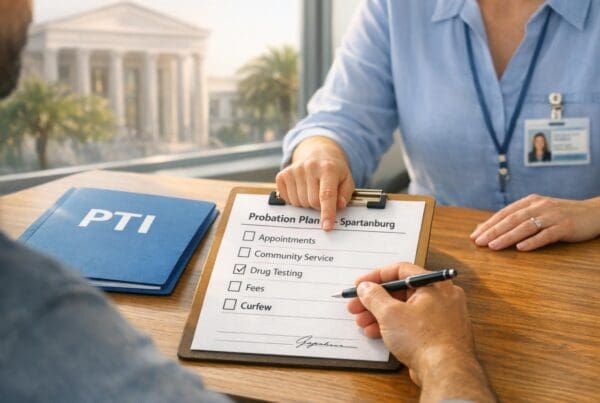Facing misdemeanor charges can be overwhelming. While misdemeanors are less severe than felonies, they can still lead to jail time, fines, and long-term consequences like a criminal record that impacts jobs, housing, and licenses. Hiring a lawyer can help protect your rights, reduce penalties, and navigate complex legal procedures. Self-representation may seem cost-effective but often leads to mistakes and harsher outcomes. If jail time is possible or charges are complicated, legal representation is crucial.
Key Points:
- Misdemeanors in South Carolina: Punishable by up to 3 years in jail, divided into Class A, B, and C with varying penalties.
- Risks of Self-Representation: Procedural errors, lack of legal knowledge, and emotional missteps can harm your case.
- Benefits of a Lawyer: Expertise in evidence, plea deals, and local laws can improve outcomes and minimize long-term effects.
Hiring a lawyer early increases your chances of a better resolution and avoids costly mistakes.
Problems with Representing Yourself in Court
While self-representation might seem like a way to save money, it often comes with serious risks. Court systems operate under strict rules, deadlines, and procedures that can feel overwhelming if you don’t have legal training. Missing a deadline or filing a document incorrectly can hurt your case – and your future. Without the right expertise, handling these demands becomes even more challenging.
Court Procedures Are Difficult to Navigate Alone
Legal proceedings are filled with precise terminology and procedures that take years of practice to master. Without this knowledge, you might mishandle evidence or fail to make timely objections. In South Carolina, for instance, judges are known to have little patience for procedural mistakes made by individuals representing themselves.
Common Mistakes in Self-Representation
One of the biggest risks of self-representation is letting emotions cloud your judgment. This can lead to harmful statements to law enforcement or on social media that could damage your case. Many people also overestimate the strength of their case or underestimate its complexity, leaving them unprepared to negotiate plea deals or present essential evidence. Ignoring court orders or failing to focus on the key issues can further weaken your defense. These missteps can have lasting consequences.
The Long-Term Impact of a Conviction
Even a misdemeanor conviction can leave a permanent mark on your record, making it harder to find a job, secure housing, or obtain professional licenses. Procedural mistakes during self-representation can also lead to long-term consequences – for example, judgments in debt-related cases can remain on your record for up to 10 years.
The complexity of court procedures, the potential for critical errors, and the far-reaching impact of a conviction highlight why having experienced legal representation is so important. In South Carolina, more than 70% of people in civil court cases go without legal counsel, which shows just how difficult it can be to access proper legal help. Understanding these risks can help you decide whether to seek professional assistance for your misdemeanor case.
How a Lawyer Helps with Misdemeanor Cases
Facing a misdemeanor charge can feel overwhelming, but having a criminal defense attorney on your side can make all the difference. Instead of trying to navigate the legal system alone, you’ll have an advocate who knows the ins and outs of the law and is committed to protecting your rights. The right lawyer can mean the difference between a conviction that lingers on your record and an outcome that allows you to move forward.
Building a Strong Defense
A defense attorney doesn’t just show up in court – they build a case tailored to your situation. This starts with carefully reviewing police reports, interviewing witnesses, and analyzing evidence. They’ll dig deep to find any procedural missteps, such as evidence collected through illegal searches or arrests, and file motions to suppress anything obtained unlawfully. This might also involve questioning the reliability of tools like breathalyzers or verifying if evidence was handled correctly throughout the process.
But it’s not just about challenging evidence. Your lawyer will craft legal arguments based on your unique circumstances. Whether it’s self-defense, mistaken identity, or lack of intent, they’ll work to highlight reasonable doubt in your case. If you have an alibi, they’ll establish it, and they’ll also scrutinize eyewitness accounts for inconsistencies. Throughout it all, your attorney ensures your constitutional rights are upheld and that you avoid self-incrimination. This approach not only strengthens your defense but also positions you for strategic plea negotiations if needed.
Negotiating Plea Deals and Seeking Reduced Sentences
Prosecutors often prefer to resolve cases without going to trial, but negotiating a favorable plea deal requires skill and experience. Your attorney will assess the evidence, pinpoint weaknesses in the prosecution’s case, and determine whether accepting a plea deal is in your best interest. They’ll also explore alternatives to jail time, such as diversion programs, community service, or drug court, depending on the circumstances.
It’s important to remember that prosecutors aren’t required to offer a plea deal, and not every deal is beneficial. That’s why your lawyer will break down each offer, explaining the potential outcomes and long-term impact. With a deep understanding of local court practices, they can leverage mitigating factors to negotiate better terms on your behalf.
Navigating South Carolina’s Courts and Laws
South Carolina’s legal system comes with its own set of rules, procedures, and nuances that can be daunting for anyone unfamiliar with them. An experienced local attorney brings valuable insight into how these systems operate. They know how different judges approach cases and how prosecutors typically handle similar charges. This knowledge can be a game-changer when exploring options like pre-trial intervention programs or diversion measures that might be available in your area.
When You Must Have a Lawyer
While you have the constitutional right to represent yourself in court, there are situations where having a lawyer isn’t just helpful – it’s essential. The Supreme Court has ruled that the right to legal counsel applies to misdemeanor cases if there’s a risk of "the actual deprivation of a person’s liberty". In other words, if jail time is a possibility, having an attorney becomes critical to safeguarding your rights. This principle highlights the importance of legal representation in cases where the stakes are high.
Serious Charges or Complex Cases
When facing serious misdemeanor charges, the potential consequences can escalate quickly. For instance, repeat offenses in South Carolina can push misdemeanor charges to the felony level under the state’s repeat offender laws. Penalties can also become more severe when aggravating factors – like prior convictions or the involvement of a deadly weapon – are present. These factors can significantly increase the stakes, making professional legal guidance indispensable.
Getting a Lawyer Early Improves Your Case
Timing is everything in criminal defense. Once you’re charged with a misdemeanor, evidence can disappear, and deadlines can creep up fast. Getting a lawyer involved as early as possible helps protect your rights and may even lead to reduced charges or penalties.
Early legal intervention ensures critical evidence is preserved and allows for the development of a strong defense strategy. In South Carolina’s municipal courts, defendants must be informed of their right to legal counsel, and a public defender is provided unless the defendant knowingly waives this right. However, there have been allegations – such as in the case of Bairefoot v. City of Beaufort – that some South Carolina municipal courts fail to properly advise defendants of this right before sentencing them to jail.
If you wait until after entering a guilty plea or being convicted, your options narrow significantly. Working with an experienced attorney from the start helps you avoid costly, irreversible mistakes. Considering that around 13 million misdemeanor cases are filed annually – accounting for about 80% of criminal court dockets – having a skilled lawyer by your side can make a world of difference.
sbb-itb-ce0cbb0
Self-Representation vs. Hiring a Lawyer
When facing misdemeanor charges in South Carolina, you’re faced with a critical decision: should you represent yourself or hire a lawyer? This choice can significantly influence the outcome of your case, and understanding the key differences between these options is crucial.
Statistics highlight the stark contrast in outcomes. For example, a U.S. Justice Department study found that only 10% of self-represented individuals in immigration appeals achieved favorable outcomes, compared to 40% of those with pro bono attorneys. Similarly, research from Temple University’s Political & Civil Rights Law Review showed that people seeking protective orders succeeded 83% of the time with an attorney, versus just 32% for those representing themselves.
"It is often said that a person who represents himself has a fool for a client." – 394th District Court of Texas
The legal system doesn’t cut any slack for self-represented individuals (pro se litigants). They are held to the same standards as attorneys, expected to understand laws, court rules, and procedures. This creates a steep disadvantage, as most pro se litigants lack the legal expertise and courtroom experience needed to navigate the system effectively.
Main Differences Between Self-Representation and Legal Help
The gap between representing yourself and hiring a lawyer goes far beyond who speaks for you in court. Here’s a breakdown of how the two approaches compare on critical factors:
| Factor | Self-Representation | Hiring a Lawyer |
|---|---|---|
| Knowledge of Legal Procedures | Limited understanding of South Carolina law and court rules | Comprehensive knowledge of state law, constitutional rights, and court procedures |
| Negotiation with Prosecutors | Little to no experience with plea deals or legal negotiations | Skilled negotiators with established relationships in the courtroom |
| Risk of Harsher Penalties | Greater risk of maximum sentences and fines | Expertise in reducing penalties and exploring alternative sentencing |
| Understanding of Evidence Rules | Often unaware of what evidence is admissible | Deep understanding of evidence rules and how to challenge the prosecution’s case |
| Long-term Consequences | May overlook how a conviction impacts employment, housing, or future charges | Provides guidance on record expungement and minimizing long-term repercussions |
| Court Experience | Minimal familiarity with courtroom customs and procedures | Extensive trial experience and knowledge of local court practices |
| Upfront Costs | No attorney fees, making it appear more affordable initially | Represents an investment that can save money in the long run |
| Long-term Financial Impact | Risk of higher fines and collateral consequences | Often prevents severe financial and legal complications down the road |
These distinctions show why having legal representation often leads to better outcomes.
One of the biggest challenges for many defendants is affordability. Statistics reveal that around 80% of criminal defendants in state courts can’t afford a lawyer. This financial barrier forces many to represent themselves, but the hidden costs of self-representation – like harsher penalties, extended probation, or even jail time – can far outweigh the upfront expense of hiring an attorney.
Lawyers bring more than just legal knowledge to the table. They understand the unwritten rules of the courtroom and have established relationships with judges and prosecutors that can work in your favor. They know which arguments are most effective for specific charges and how to navigate the nuances of various courtrooms.
"While you have the right to self-represent, doing so puts you at a significant disadvantage." – Dallas County court system
Cost is another critical factor. While self-representation might seem like the cheaper option initially, hiring a lawyer can actually save you money in the long term. A skilled attorney can help you avoid fines, jail time, and other financial consequences. Beyond the courtroom, a misdemeanor conviction can have lasting effects on your ability to find a job, secure housing, or obtain professional licenses – costs that far exceed attorney fees.
If you’re considering self-representation, be prepared to remain objective and master complex court rules. The legal system is intricate, and the stakes are often much higher than they appear at first glance.
Making the Right Decision for Your Case
Choosing whether to hire a lawyer for a misdemeanor charge is about more than just the upfront costs – it’s about safeguarding your future. Having professional legal representation can greatly increase your chances of achieving a better outcome and help you avoid long-term repercussions that could follow you for years.
In South Carolina, even minor misdemeanor charges can carry harsh penalties, such as up to three years in jail, a permanent criminal record, and additional consequences that can impact your ability to secure a job, find housing, or maintain professional licenses. Unfortunately, many individuals plead guilty to "move on quickly", not fully understanding how a conviction could alter the course of their lives.
Statistics reveal that financial concerns often lead defendants to represent themselves. However, self-representation frequently results in less favorable outcomes, including stricter penalties and missed chances for reduced charges or case dismissals. Local legal expertise can make a significant difference in navigating these challenges and avoiding costly mistakes.
In South Carolina, understanding the local legal landscape is crucial. Attorneys familiar with the state’s court procedures, as well as its judges and prosecutors, are in a better position to uncover opportunities that self-represented individuals might miss. While hiring a lawyer involves an upfront expense, the potential financial impact of a conviction – such as fines, higher insurance premiums, and lost job opportunities – can far outweigh the cost of legal representation.
The sooner you consult with a lawyer, the more options you’ll have. Attorneys can start building your defense, negotiate with prosecutors, and gather evidence early in the process, which can significantly influence the outcome of your case.
If you’re facing misdemeanor charges in South Carolina, you don’t have to navigate this complex process alone. Brendan M. Delaney Law Firm LLC offers free initial consultations to help you understand your rights and explore possible solutions without any upfront obligation. With over 24 years of experience in South Carolina’s legal system, the firm provides personalized attention and local knowledge tailored to your situation. Don’t leave your future to chance – reach out to Brendan M. Delaney Law Firm LLC today to discuss how professional legal representation can make a real difference in your case.
FAQs
What lasting effects can a misdemeanor conviction have on my life?
A misdemeanor conviction can cast a long shadow over your personal and professional life. It can restrict career prospects, especially in industries like healthcare, education, or law enforcement, where background checks and professional licenses are standard requirements. Beyond employment, it might also create roadblocks when applying for loans, renting housing, or even obtaining certain travel permissions.
For non-citizens, the stakes can be even higher. A misdemeanor conviction could lead to complications with visas, residency applications, or other immigration processes. These consequences often extend far beyond the initial penalties, potentially derailing long-term plans and financial security. Consulting a legal professional can be a crucial step in mitigating these challenges and safeguarding your future.
Why is it important to hire a lawyer early when facing a misdemeanor charge?
Hiring a lawyer as soon as possible when facing a misdemeanor can make a big difference in how your case unfolds. A seasoned attorney can safeguard your rights, thoroughly examine the evidence, and pinpoint any weak spots in the prosecution’s case. Acting early also gives your lawyer the opportunity to negotiate plea agreements, push for reduced charges, or even aim to have the charges dropped altogether.
On top of that, a lawyer can guide you through the often confusing court processes, helping you avoid missed deadlines or errors that could hurt your case. By getting legal help right away, you give your attorney the time and tools needed to craft a solid defense and strive for the best possible outcome.
What are the risks of representing yourself in a misdemeanor case, and how could it impact the outcome?
Choosing to handle your misdemeanor case without a lawyer can be a gamble, often leading to unexpected and unfavorable outcomes. Without a solid understanding of legal procedures, it’s easy to slip up – like misreading court rules or unintentionally saying something that could be taken as an admission of guilt. These kinds of mistakes can lead to harsher consequences, including steeper fines, extended probation, or even jail time.
On top of that, representing yourself often means missing out on opportunities to negotiate plea deals or explore ways to reduce charges. The legal system is complicated and can feel overwhelming, especially when emotions are running high. This might cloud your judgment and lead to choices that hurt your case. An experienced attorney, on the other hand, can safeguard your rights, help you navigate the process, and work toward achieving the best outcome for your situation.





